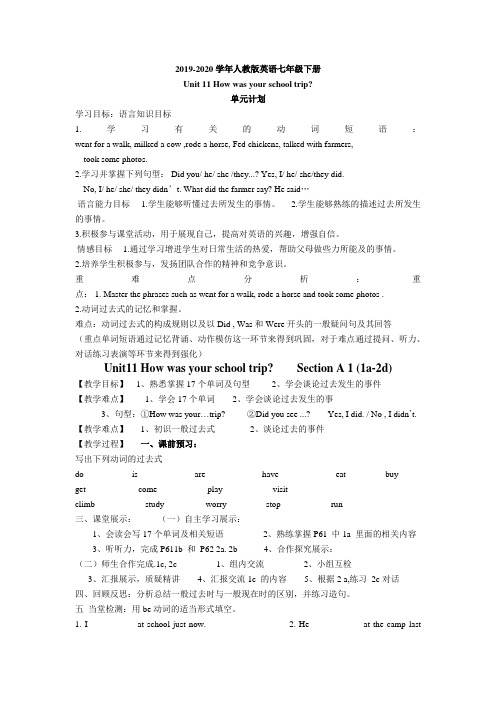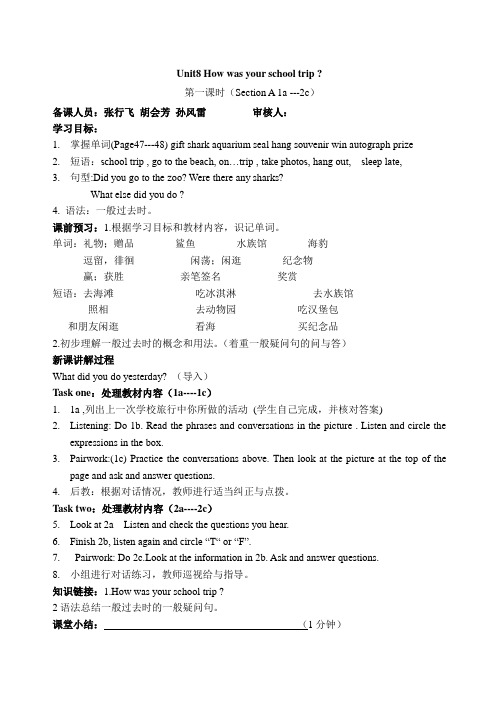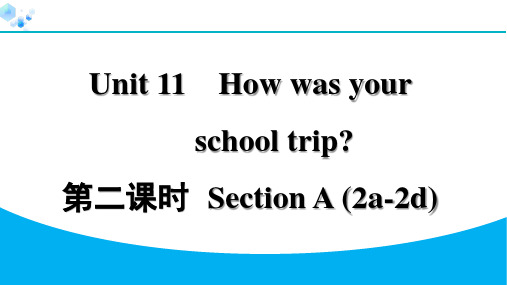人教版英语七年级下册Unit How was your school trip词句精讲精练
人教版七年级英语下册Unit11 How was your school trip说课稿(模版一)

Unit11 How was your school trip?說課稿(模版一)一.教材分析本单元以How was your school trip ? 为中心话题,让学生学会谈论和分享过去发生的事件。
本课以听说的方式围绕着描述“过去发生的事情”展开,学习和运用一般过去时态的一般疑问句Did you go…? Were there any…?二.教学目标1. 语言知识目标词汇:gift shark aquarium seal prize hangout souvenir win autograph 句型:——Did you go to the zoo? ——Yes, I did. /No, I didn’t. I went to the aquarium. ——Were there any sharks? ——Yes, there were. /No, there weren’t any sharks.2. 语言技能目标1).能在本课的任务型活动中进行简单的交流。
2).能运用简单的句子写出过去的活动及感受。
3. 情感目标1)、使学生在人际交往中学会尊重和理解别人。
2)、使学生抒发热爱祖国、热爱大自然的情感三.教学策略开放式教学策略。
兴趣激发策略。
任务型活动策略。
循序渐进和尊重差异策略。
四.学情分析根据所教学生的特点:1、心理特点兴趣:好奇心强记忆:需要多方面刺激思维:偏重于形象思维评价:很在乎他人的评价2、知识基础五.教学重点和难点词汇:hang out souvenir autograph prize 词组:went to the aquarium hung out with …went to the zoo saw some seals had a hamburger bought a souvenir ate some ice cream saw some sharks 句型: 过去时态的两种一般疑问句及简单回答。
Unit11How+was+your+school+trip+课件22-23学年人教版英语七年级下册

so expensive
Underline (划线) the phrases and the sentences
1.参加学校郊游
go on a school trip
2.沿途
along the way
3.教我们怎么制作机器人 teach us how to make robots
answer the questions.
1. Did Helen and Jim go on the same trip? Yes, they did. They went on the same trip.
2. How do they feel about the trip? Helen thought the trip was really interesting and exciting, but Jim didn’t like the trip at all.
go to the countryside great
A: __H_o_w__w_a_s__ your school trip? B: It was great. A: _W__h_a_t_d_i_d__ you do? B: We went to the countryside.
We had a really good time!
1.Where did Helen go on June 15th? She went to the science museum. 2.How did she go there? She went there By train. 3.Did she learn anything at the science museum? Yes, she did. She learned a lot about robots. 4.What did the guide teach Helen to do? The guide taught her how to make a model robot. 5.Did she take any photos? Yes, she did. She took a lot of great photos. 6.What did she buy for her parents? She bought some lovely gifts for her parents.
2019-2020年人教版英语七年级下册Unit 11 How was your school tr

2019-2020学年人教版英语七年级下册Unit 11 How was your school trip?单元计划学习目标:语言知识目标1.学习有关的动词短语:went for a walk, milked a cow ,rode a horse, Fed chickens, talked with farmers,took some photos.2.学习并掌握下列句型: Did you/ he/ she /they...? Yes, I/ he/ she/they did.No, I/ he/ she/ they didn’t. What did the farmer say? He said…语言能力目标 1.学生能够听懂过去所发生的事情。
2.学生能够熟练的描述过去所发生的事情。
3.积极参与课堂活动,用于展现自己,提高对英语的兴趣,增强自信。
情感目标 1.通过学习增进学生对日常生活的热爱,帮助父母做些力所能及的事情。
2.培养学生积极参与,发扬团队合作的精神和竞争意识。
重难点分析:重点: 1. Master the phrases such as went for a walk, rode a horse and took some photos .2.动词过去式的记忆和掌握。
难点:动词过去式的构成规则以及以Did , Was 和 Were 开头的一般疑问句及其回答(重点单词短语通过记忆背诵、动作模仿这一环节来得到巩固,对于难点通过提问、听力、对话练习表演等环节来得到强化)Unit11 How was your school trip? Section A 1 (1a-2d)【教学目标】1、熟悉掌握17个单词及句型2、学会谈论过去发生的事件【教学难点】1、学会17个单词2、学会谈论过去发生的事3、句型:①How was your…trip? ②Did you see ...? Yes, I did. / No , I didn’t. 【教学难点】1、初识一般过去式2、谈论过去的事件【教学过程】一、课前预习:写出下列动词的过去式do______ is_______ are_______ have_______ eat____ buy_____ get______ come ______ play _____ visit______climb ______ study _____ worry_____ stop _____ run_____三、课堂展示:(一)自主学习展示:1、会读会写17个单词及相关短语2、熟练掌握P61 中1a 里面的相关内容3、听听力,完成P611b 和P62 2a. 2b4、合作探究展示:(二)师生合作完成.1c, 2c 1、组内交流2、小组互检3、汇报展示,质疑精讲4、汇报交流1c 的内容5、根据2 a,练习2c对话四、回顾反思:分析总结一般过去时与一般现在时的区别,并练习造句。
人教版七年级下册英语课件:Unit 11 How was your school trip_Section A(1a-2d) (共39张PPT)

Eric: I weRntefaisdhitnhgeevceorny vdeary.sAatnidonI fed the chickens waigthaimny, tghraenndpfial.lI_it_nw_a_tsh_s_eo_m__u_c_h_f_u_n. Peter: Soubnldasngkosodb.He_lo_ow_w_w_.a_s_t_h_e_w__ea_t_h_e_r_th_e_r_e?
4. Did Eric watch the stars at night? Yes, he did.
2d P62
L1ine.tRg’rosoleusppeslea; ywthhe iccohnvegrrsoatuiopn 2. Rodleopelsaytthhee cboensvetr.sation
A: Did he _ri_d_e__a_h_o_r_s_e last weekend? B: Yes, he did.
2a Listen and check ( ) the questions you hear. P62
___ What did the farmer say? ___ Did you grow any apples? ___ What did you see? ___ Do they grow apples? ___ Did you learn anything? ___ Did you eat them? ___ Did you ask him any questions? ___ Were they good?
1. How was Eric’s trip last week? It was excellent.
how was your school trip 学案

Unit8 How was your school trip ?第一课时(Section A 1a ---2c)备课人员:张行飞胡会芳孙风雷审核人:学习目标:1.掌握单词(Page47---48) gift shark aquarium seal hang souvenir win autograph prize2.短语:school trip , go to the beach, on…trip , take photos, hang out, sleep late,3.句型:Did you go to the zoo? Were there any sharks?What else did you do ?4. 语法:一般过去时。
课前预习:1.根据学习目标和教材内容,识记单词。
单词:礼物;赠品鲨鱼水族馆海豹逗留,徘徊闲荡;闲逛纪念物赢;获胜亲笔签名奖赏短语:去海滩吃冰淇淋去水族馆照相去动物园吃汉堡包和朋友闲逛看海买纪念品2.初步理解一般过去时的概念和用法。
(着重一般疑问句的问与答)新课讲解过程What did you do yesterday? (导入)Task one:处理教材内容(1a----1c)1.1a ,列出上一次学校旅行中你所做的活动(学生自己完成,并核对答案)2.Listening: Do 1b. Read the phrases and conversations in the picture . Listen and circle theexpressions in the box.3.Pairwork:(1c) Practice the conversations above. Then look at the picture at the top of thepage and ask and answer questions.4.后教:根据对话情况,教师进行适当纠正与点拨。
人教版七年级英语下册《How was your school trip》PPT教学课件(第1课时)

写一篇短文。
4. No one _c_a_m__e (come) to the concert because of the bad weather.
5. Last Tuesday Miss Cooler _d_id_n_’_t__ t_a_k_e__ (not take) a class.
6. How was your _d_a_y__o_f_f_ (休息日), Da Ming?
Section B 1a-1d
➢ Objectives
To learn the phrases: go to the zoo, visit a museum, ride a horse, climb a mountain, visit a fire station, go fishing.
To learn Jane’s and Tony’s school trips.
1c
Listen again. What did Jane and Tony do on their last school trip? Check(√) Tony or Jane.
went to the climbed a went to an saw some drew countryside mountain art museum paintings pictures
1b Listen and answer the questions.
2024年人教版七年级英语下册第十一单元课堂练习题及答案第2课时 Section A(2a-2d)

A. Their homesickness lasted long.
B. The children stayed on the farm for a week.
C. The writer had to work together with his friends in the boating class. D. It was the first time for the children to be away from their parents.
a lot about the spirit (精神) of Xibaipo.
A. learn
B. learned
C. will learn D. are learning
一二三四 五
基础通关 能力突破 素养达标
( D )10.— Sorry,I’m busy. I can’t go fishing with you.
us laugh happily during the class.
During the week I learned a lot and made many new friends. I also learned
how to take care of myself.
一二三四 五
基础通关 能力突破 素养达标
一二三四 五
基础通关 能力突破 素养达标
4. — I met my favorite actor yesterday. — Lucky (luck) you. 5.[2022黑龙江龙东中考]Tom visited (visit) the British Museum every month when he was in London.
人教版英语七下课件Unit_11_How__was_your_school_trip_?_Section__B

a
d
b
f
c
写出下列动词的过去式。
不规则动词
go went ride rode
do did
is
was
are were
have had
eat ate
buy bought
see saw
规则动词
pick picked visit visited
watch watched
climb climbed
study studied
否定句:句中有were或was在构成否定句时, 在was或were后面加not
Youweren’tatschoolyesterday.(否定句)
疑问句:构成疑问句时,把were或was放在主 语前面,句尾加问号;肯定回答和否定回答 时态要与问句中的时态一致
---Wereyouatschoolyesterday?(一般疑问句) ---Yes,Iwas. ---No,Iwasn’t.
Whatdoyoudoe Whatdidyoudola
veryday?
stweekend?
feedchickens
fedchickens
milkacow
milkedacow
rideahorse
rodeahorse
Whatdoeshe/shedoWhatdidhe/shed
everyday?
oyesterday?
写出下列动词的过去式:
• go—hwaevne/thas—see— had • eat—bautye—take—bought ride—fereodd—ebring--- fed • is/am-awrea-s--come-w--ere buy---cubto--u-dgoh/tdoes---cut
- 1、下载文档前请自行甄别文档内容的完整性,平台不提供额外的编辑、内容补充、找答案等附加服务。
- 2、"仅部分预览"的文档,不可在线预览部分如存在完整性等问题,可反馈申请退款(可完整预览的文档不适用该条件!)。
- 3、如文档侵犯您的权益,请联系客服反馈,我们会尽快为您处理(人工客服工作时间:9:00-18:30)。
Unit 11 How was your school trip?词汇精讲1. milk(1)milk 作名词,意为“牛奶”,是不可数名词。
例如:I’d like a cup of milk. 我想要杯牛奶。
(2)milk 作动词,意为“挤奶”。
例如:I helped the farmer (to) milk the cow. 我帮助农民挤奶。
2. feedfeed 作及物动词,意为“喂养,饲养”,其后常接表示动物名称的词作宾语。
例如:My fa ther’s job is to feed the animals. 我父亲的工作是喂养动物。
拓展:(1)feed..to…意为“把……喂给……吃”。
feed后接饲料或者食物名称做宾语,to为介词,其后一般接动物或者小孩等名词表示对象。
例如:Please feed some grass to the cow. 请给这头奶牛喂些草。
She fed milk to the baby. 她给婴儿喂了奶。
(2)feed 可以做不及物动词,意为“食,吃”(主要指动物),与介词on构成词组,意为“以……为食,靠……为生”。
例如:Sheep feed on grass. 绵羊以草为食。
3. quite&very4. anythinganything 不定代词,意为“任何事情,任何东西”,常用于否定句和疑问句中,在肯定句中常用something。
something, anything作主语时,谓语动词用单数。
例如:I can’t see anything in the box. 盒子里我看不到任何东西。
Is there anything in the box? 盒子里有一些东西吗?5. pickpick意为“采,摘”,常用于词组“pick up”,意为“拾起,捡起”, 当宾语为代词时,宾语应放在pick和up中间;当宾语为名词时,宾语可放中间,也可放在后面。
例如:There is a pen on the playground, please pick it up. 地上有一支笔,请捡起它。
Bob stopped to pick up a watch. = Bob stopped to pick a watch up.Bob停下来,捡起来地上的一块手表。
拓展:(1)pick up意为“搭载,开车去接”。
例如:The bus stopped and picked up some passengers.公共汽车停下来,搭载了一些乘客。
Please wait at the school gate. John will pick you up there.请在校门口等候, 约翰会到那里接你。
(2)pick up意为“偶然学会,获得”。
例如:She picked up English when she played with the American children.她和美国小孩儿玩的时候不经意间学会了英语。
6. worry(1)worry可用作不及物动词或及物动词。
作及物动词时,意为“使烦恼,使担忧”。
作不及物动词时,意为“发愁,担心,烦恼”,常与介词about连用。
例如:What’s worrying you? 什么事使你烦恼?Don’t worry about me. 不要为我担心。
(2)worry也可用作名词。
既可作可数名词,也可作不可数名词。
例如:Her face showed signs of worry. 她脸上显出担忧的神情。
I have a lot of worries. 我有很多担心。
(3)worry的过去分词worried相当于形容词,意为“担心的,烦恼的”,常与be/look/feel 等系动词连用。
be worried about意为“为……担心”。
例如:She is worried about her sick mother. 她担心她生病的母亲。
7. luckilyluckily是副词,意为“幸运地,幸亏,侥幸”。
例如:Luckily there was a doctor on the spot.幸运的是现场有一位医生。
拓展:lucky是luckily的形容词形式,意为“幸运的, 吉祥的, 侥幸的”。
例如:He is a lucky dog. 他是个幸运的家伙。
luck是luckily的名词形式,是不可数名词;意为“运气, 好运, 幸运”。
good luck to sb 表示“祝某人好运”,bad luck意为“倒霉”。
例如:She had no luck finding a job. 她很不幸,找不到工作。
I wish you luck =Good luck to you! 祝你好运!8. exciting&excitedexciting是形容词,意为“令人兴奋的”,一般用来说明事物的特征。
例如:I like football. I think it’s very exciting. 我喜欢足球。
我认为它非常令人兴奋。
excited也是形容词,意为“感到兴奋的”,一般用来说明人的感受。
例如:He is very excited at the news. 因为那个消息他很兴奋。
9. slow(1)slow 作形容词,意为“缓慢的,迟缓的”,其反义词为fast。
例如:Why are you so slow? Hurry up!It’s late.你怎么这么慢啊?快点!要迟到了。
(2)slow 和slowly一样也可以作副词,但是用法有区别。
slow一般用于口语中,不可以用于句首,只能和go, drive或pass连用且位于其后。
而slowly比较常用,可以置于句首或者动词之后(或前)修饰动词。
例如:How slow the time passes! 时间过得真慢!I told the driver to go slow. 我告诉司机慢点开车。
He slowly opened the door. 他慢慢地把门打开。
10. fast(1)fast 作副词,意为“快地”,可以用来修饰动词或者动词短语。
例如:We got there so fast by train. 我们乘火车很快到了那儿。
(2)fast 作形容词,意为“快的”。
例如:A train is very fast. 火车很快。
拓展:fast&quicklyfast强调动作的速度快;quickly 指动作敏捷或者完成得快。
例如:Li Ming can run very fast. 李明能跑的很快。
He had breakfast quickly and then went to school. 他快速吃完早餐去上学了。
11. all in allall in all 固定词组,意为“总的来说”,常用于句首。
例如:All in all, it is a great success. 总的来说,它非常成功。
All in all, I’m too excited. 总的来说,我太兴奋了。
拓展:常见的和all有关的词组after all 毕竟,终究all over 到处not…at all 根本……不all right 行,好的in all 总共12. dark(1)dark作形容词,意为“黑暗的,昏暗的”。
例如:The room is dark and quiet. 这个房间漆黑一片,寂静无声。
(2)dark 作名词,意为“黑暗,无光(尤指夜晚)”。
例如:We stood outside in the dark. 我们站在黑漆漆的屋外。
词汇精练Ⅰ. 词形转换。
1. paint (名词)__________2. luck (副词)________3. love (形容词)_________4. interest (形容词)_______5. fast (反义词)_________6. cheap (反义词)_______Ⅱ. 根据句意、汉语意思或首字母提示补全单词。
1. She is badly ill and her mother is w______ about the health.2. Look at the apple on the trees. Can you p______ one for me?3. Slow down! You’re driving too f______.4. I got many g______ on my birthday.5. The car is too e________ for me to afford.6. All in a______. You’re too lucky.7. This is q______ an interesting book.8. I gave some f______ to my mother on Mother’s Day.9. I never go to the cities. I come from the c_______.10. We can get milk from the c______.Ⅲ. 用括号中所给单词的适当形式填空。
1. He went to the farm and ______ (feed) many chickens there.2. My friend gave me a _______ (love) dog yesterday.3. Peter and his family _______ (have) a good time in the park yesterday.4. He ______ (milk) a cow yesterday.5. Is there _______ (something) new in today’s newspaper?6. The old man walked ______ (slow).7. ______(luck), he passed the exam.8. I like this movie. I think it’s very _______ (excited).9. It was _______ (sun) yesterday.10. Thanks for _______ (tell) me the good news.IV. 听力链接。
2020年初一英语下学期(2015 湖南张家界中考)选择与所听句子意思相关的图画(图画有多余选项)。
A BC DE F1._____2._____3._____4._____5._____参考答案Ⅰ. 词形转换。
1. painting2. luckily3. lovely4. interesting / interested5. slow6. expensiveⅡ. 根据句意、汉语意思或首字母提示补全单词。
